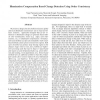Free Online Productivity Tools
i2Speak
i2Symbol
i2OCR
iTex2Img
iWeb2Print
iWeb2Shot
i2Type
iPdf2Split
iPdf2Merge
i2Bopomofo
i2Arabic
i2Style
i2Image
i2PDF
iLatex2Rtf
Sci2ools
111
click to vote
CVPR
2010
IEEE
2010
IEEE
Illumination compensation based change detection using order consistency
We present a change detection method resistant to global and local illumination variations for use in visual surveillance scenarios. Approaches designed thus far for robustness to illumination change are generally based either on color normalization, texture (e.g. edges, rank order statistics, etc.), or illumination compensation. Normalization based methods sacrifice discriminability while texture based methods cannot operate on texture-less regions. Both types of method can produce large missing regions in the distance image which in turn pose problems for higherlevel processing tasks that may be shape or region-based and require accurate foreground masks (e.g. person detection and tracking, crowd segmentation, etc.). Texture based methods have an additional problem in that they produce false alarms due to textures induced by local illumination effects (e.g. cast shadows). In this paper we propose a compensation based approach for change detection. Prior work on compensation has lar...
Related Content
| Added | 06 Dec 2010 |
| Updated | 06 Dec 2010 |
| Type | Conference |
| Year | 2010 |
| Where | CVPR |
| Authors | Vasu Parameswaran, Maneesh Singh, Visvanathan Ramesh |
Comments (0)

